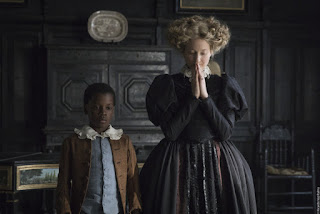It's only 5 years since Łódź Film School inaugurated the "Diploma Film," a final project for the year's contingent of graduating students. But in that short time the initiative has firmly established itself as an important and anticipated tradition for the School.
Last year, with Monument, Jagoda Szelc produced the best of the Diploma films yet: a hypnotic and unsettling mood piece that finally revealed its hand as a shrewd meta-reflection on the experience of studying at the school itself. The confidence of Szelc's vision was stunning and was probably made possible by the fact that she had already completed and released a first feature, the distinctive Tower. A Bright Day (2017).
An assistant director on Tower was Kalina Alabrudzińska, who now steps into the director's chair herself with this year's Diploma film Nothing is Lost (Nic Nie Ginie). A much more accessible offering than Monument, Alabrudzińska's film, which she describes as "a sad comedy," doesn't attempt to replicate its predecessor's oddity or intensity, instead treating serious subject matter in a much lighter way. Screened at Koszalin's 38th Youth & Film festival, where it won the prize for Best Directing, the result is an attractive ensemble drama that will likely have far wider general audience appeal than Monument's trippier vision.
That said, Nothing is Lost actually starts out as "meta" as Monument ended up - with a cheeky reflection on "group therapy" scenes in cinema. Such a session is getting underway as the film commences, and finds the characters wondering: "Are we gonna sit in a circle like this? There are scenes like that in movies. Usually the most boring scenes..." This self-reflexive opening establishes the humourous tone of the film, which never becomes a mere mope-fest. Doubtless mindful to incorporate as many of the graduating actors as possible, Alabrudzińska uses the context of the therapy meetings to bring together a group of diverse characters - and then to branch out into snapshots of their lives and relationships outside the sessions.
As the "lost" or searching protagonists start to open up and "find" something in the therapy, the set-up sometimes gives off Breakfast Club vibes. But, working from her own script, Alabrudzińska prevents the film from degenerating into a series of predictable emotional showdowns. Bonding scenes and so-called "breakthrough moments" tend to be underplayed, and not everything resolves in the way you anticipate (or at all).
As such, the film avoids obviousness, allowing its characters to retain a bit of mystery. The storytelling is helped by the contribution of cinematographer Nils Croné, who gives the images a clear, warm, burnished look that's very inviting, and by the crisp editing of Piasek & Wójcik (following their work on Ewa Podgorska's brilliant Diagnosis), which moves us fluidly between the therapy sessions and the characters' individual lives.
Still, while the technical side is more than proficient, Nothing is Lost's main asset is its performers, and those who've been lucky enough to see these actors' often amazing stage work over the past year (in new extravaganzas like Fever, devised pieces such as Slippery Words, or contemporary classics like Angels in America) will be particularly delighted to find them taking to the camera with equal assurance.
Alabrudzińska's writing allows the actors to develop characters who are relatable but who go beyond conventional "types." Michał Surosz is lovely as a guy so dedicated to saving a particular endangered species of turtle that all his other relationships are neglected. Wiktoria Filus charms as a single mum trying out Tinder, and Jan Hrynkiewicz delivers delectably mean put-downs with aplomb as the group's most caustic participant. Zuzanna Puławska is funny and touching as a mother-dominated people-pleaser, and charismatic Piotr Pacek shines as an actor with interpersonal issues - so much so that he feels rejected by nature itself. (The film makes nature a motif, in fact: plants, trees and the aforementioned turtles all feature in the protogonists' attempts to connect.)
And in case it seems that the focus is entirely on personal concerns, Nothing is Lost doesn't shy away from the wider context of darker elements of contemporary Polish political reality, either. The most ambitious sequence here is a night-time nationalist gathering attended by Hrynkiewicz's character and featuring Elżbieta Zajko as a firebrand delivering hate speech, with Kamil Rodek and Mateusz Grodecki on hand as colleagues, the latter playing guitar and singing that "The day of mighty Poland is coming."
Some of the smaller roles need further development; one senses a few of the actors' eagerness to go further into the characters than their fleeting appearances allow. But Robert Ratuszny and Faustyna Kazimierska - memorably opening a beer bottle with her teeth! - maximise their brief screen time, while, in one of the best sequences, Karol Franek Nowiński flashes his great grin - surely one of the best smiles the Polish screen has seen - as a pharmacist who pleases Pacek's character by revealing himself to be a fan - before their exchange is given a great comic twist. And Ksenia Tchórzko gets a lovely appearance as a dog-sitting neighbour, when the film belatedly digresses to focus on the therapist, Remek (excellent Dobromir Dymecki), himself.
Such moments cut to the heart of the concern with human interaction which is the main preoccupation of Nothing is Lost. In the introduction to Powidoki / Afterimages, a poetic book of visual essays about Łódź Film School, (di)rector Mariusz Grzegorzek describes the School as "a special place" where "there flows a source of energy that connects people." In its wise and wry portrait of the challenges and possibilities of making contact, Alabrudzińska's likeable film taps into that source.
Nic Nie Ginie / Nothing is Lost will screen in the Panorama section of the Polish Film Festival in Gdynia (16 - 21 September).
NIC NIE GINIE /////// teaser ////// scenariusz i reżyseria Kalina Alabrudzińska from LODZ FILM SCHOOL on Vimeo.



















